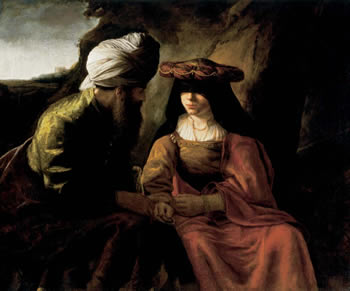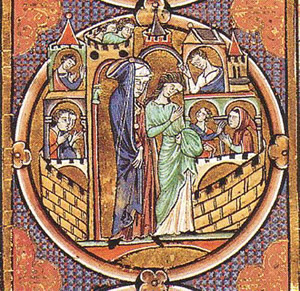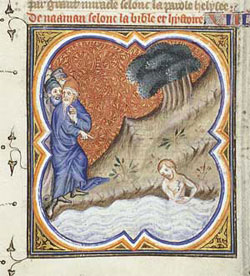A Little Girl Heals a Great Man:
Exclusion and Embrace
For Sunday February 12, 2012
Lectionary Readings (Revised Common Lectionary, Year B)
2 Kings 5:1–14
Psalm 30
1 Corinthians 9:24–27
Mark 1:40–45
Last month I read the new biography of Steve Jobs by Walter Isaacson. As head of the world's most valuable company (Apple), Jobs was the ultimate insider. He wielded power, enjoyed fame, and had a net worth of $8 billion. Just before reading the Jobs book, I read Manning Marable's critically-acclaimed biography Malcolm X. Malcolm X was the consummate outsider, so outside society's mainstream that he scorned integrationists like Martin Luther King, Jr.
 |
Judah and Tamar by school of Rembrandt. |
In his book The Faith of the Outsider; Exclusion and Inclusion in the Biblical Story (2005), Frank Spina explores the insider-outsider theme in the Bible. He reminds us that it's impossible to ignore the "scandal of particularity" throughout Scripture. In the Old Testament, Israel alone is God's elect people: "You only have I known of all the families of the earth" (Amos 3:2). And Israel is not only God's special insider community; "it is the only insider community." All other nations are distinctly outsiders — in Paul's language, "excluded from the commonwealth of Israel, and strangers to the covenants of promise" (NASB Ephesians 2:12). If you excised this insider-outsider theme from scripture, you would end up with a slender Bible indeed.
But that's only part of the story, for it's easy to find many plot reversals. When God elected one particular community, Israel, his intentions were universal in scope, that in Abraham "all peoples on earth will be blessed" (Genesis 12:3). Those same early Christians who proclaimed Jesus as the only way to the Father also imagined heaven populated with "a great multitude that no one could count, from every nation, tribe, people and language" (Revelation 7:9).
The Bible often elevates the outsider. This inclusion of outsiders, Spina argues, is "neither incidental nor haphazard in the biblical witness." These outsider stories often cast the insider in a negative light and the outsider as superior in virtue or faith. Spina's book considers seven of these stories where the outsider is brought in and the insider is cast out — Esau, Tamar (incest), Rahab (a whore), Jonah, Ruth (a resident alien), the woman at the well in John 4 who had married five times, and then the lectionary passage for this week about Naaman.
Naaman epitomizes the outsider for several reasons. He was from pagan Aram (= Syria), a military officer of a major enemy of Israel. The narrator praises Naaman in glowing terms: "He was a valiant soldier, a great man in the sight of his master and highly regarded." Then he ads a shocking detail: "through Naaman the Lord had given victory to Aram."
 |
Naomi and Ruth on the road from Moab,
entering Bethlehem, Vienna, c.1122. |
God gave victory to Israel's enemy through a pagan officer? Yes. Finally, Naaman had a skin disease (often wrongly translated as "leprosy"). This disease, as Spina notes, might have caused Naaman some medical problems, but his real complications were social, religious, and moral, for people with such "impurities" were stigmatized as ritually unclean and therefore excluded from God's community.
Consider a contemporary analogy. "Saddam Hussein was an Iraqi military general, praised by all as a valiant warrior and a great man. In fact, the Christian God had granted victory to Iraq through Saddam." This is not where the story of Naaman ends, but it's definitely where it begins.
In search of healing, this "great man" (2 Kings 5:1) embarked on a state visit with opulent gifts to visit the king of Israel, a letter of commendation in hand. Instead of the king, though, he met a nameless "little girl" (5:2) from Israel who had been captured by Aram's army and made a slave. She advised him to seek healing from the Hebrew prophet Elisha.
The irony is unmistakable and Naaman's response is predictable. When this nameless nobody instructed the renowned military officer not to seek help from the corridors of political power but from a religious prophet who told him to wash himself seven times in the Jordan River, he was incensed.
But Naaman obeyed, he was healed, and then the plot thickens when he also converted: "Now I know that there is no God in all the world except in Israel." Finally, he made a curious request to take dirt from Israel back to Aram, "for I will never again make burnt offerings and sacrifices to any other God but the Lord." Perhaps Naaman wanted to establish a portable "sacred space" back home? Although back home in Aram he continued to assist his master to worship in the temple of the deity Rimmon, Naaman asked for advance forgiveness for that compromise, and declared his fidelity to Israel's Yahweh.
Naaman the outsider joined the insider community. A nameless little girl advised a great man. And the prophetic power of Elisha subverted social and political power. The story ends with yet another reversal when greed overtook Elisha's servant Gehazi. He connived to obtain the gifts that Naaman had offered to Elisha but which Elisha had refused. Gehazi, the insider of Israel's prophet Elisha, was then struck with the skin disease that originally afflicted the outsider pagan military commander Naaman. "The story that began with this disease ends with it," writes Spina, "with the difference that its victims have been reversed: the Aramean outsider has become clean, and the Israelite insider has become unclean."
 |
Naaman washes in the Jordan River,
12th century Germany. |
Presumption is the besetting sin and chronic temptation of the insider. To our peril we ignore, shun, and vilify the outsider as strange, dangerous and unclean. We smugly imagine that we possess the truth as few others do, rather than ask God for his truth to transform us. Rather than considering solidarity with the lost, the lonely, and the outsider a privilege that enriches our lives, we construe the Biblical narrative in a narcissistic manner to serve our own petty ends.
The insider-outsider dynamic operates at many levels. Malcolm X wouldn't let us off easy about racism. Steve Jobs was famous for his cruelty. Ethnicity, an "important" job, a prestigious school affiliation, sexual orientation, socio-economic status, gender, age (consider how our society demeans the elderly), body image, and politics are all identities we alternately exclude or embrace, personas that we construct, to comfort ourselves that we are insiders and to scape goat others as outsiders. Self-delusion is never far away: "God, I thank you that I am not like all other people" (Luke 18:11).
In his book What Jesus Meant Garry Wills writes, "no outsiders were cast out far enough in Jesus' world to make him shun them — not Roman collaborators, not lepers, not prostitutes, not the crazed, not the possessed. Are there people now who could possibly be outside his encompassing love?" Instead of defining other people outside the love of God, we're better off imitating the apostle Paul, an apostolic insider, who in the epistle for this week contemplates the real and harrowing possibility of his own banishment to outsider perdition (1 Corinthians 9:24–27).
For further reflection:
* When have you experienced exclusion and/or inclusion? What factors were at play?
* Who is the most loving person you know?
* Consider other Biblical stories on this theme like the Good Samaritan or the six other stories that Spina treats.
* For further reflection: In addition to Frank Anthony Spina, The Faith of the Outsider (2005), see Amartya Sen, Identity and Violence (2006), and Exclusion and Embrace: A Theological Exploration of Identity, Otherness, and Reconciliation (1996) by Miroslav Volf.
Image credits: (1) Wikipedia.org; (2) Jewish Heritage Online Magazine; and (3) Medianet2002.de.





